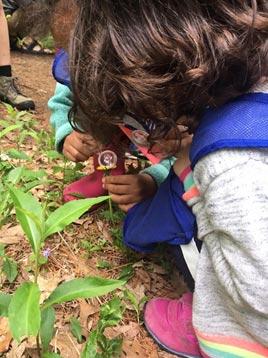
What part does science play in the Montessori preschool classroom? Whether your child is new to Montessori or you just want to learn more about what they may do during their preschool day, take a look at the top science questions parents have answered.
Is Science Important for Young Children?
Simply stated — yes. Even though your young child won’t need to learn college-level physics concepts or explore the intricacies of microbiology yet, science is an essential part of the early childhood education environment. More specifically, science can help the young child to:
- Explore their world. Your curious child wants to explore, experiment, and make discoveries. Science in the Montessori classroom provides preschoolers with an ideal way to explore in their own way.
- Problem solve. Problem-solving isn’t something that only happens during math activities. Science is a primary way to help young children think critically, analyze, and solve problems on their own.
- Build a variety of skills in other areas. As your child explores science concepts, they can build skills and develop in other areas. These include vocabulary, math, fine motor, art, and other related areas.
- Develop interest in the subject. Even though young children are naturally curious, they also need exposure to specific science concepts. Early science education can help your preschooler to develop a life-long interest in the subject.
Along with these benefits, science in the early childhood setting can help preschoolers to develop skills they’ll use as they move into the elementary years and beyond. The foundation your child builds now includes the basic knowledge and ways of thinking your child will use in kindergarten and throughout the remainder of their education.
Is Science Different in the Montessori Preschool Classroom?
There’s no universal answer to this question. Science is a core subject in most early childhood classrooms — including Montessori preschool. Even though almost every preschool classroom (Montessori or not) includes this subject area, the activities, lessons, and explorations won’t always look the same.
While some Montessori classrooms may provide dramatically different science activities in comparison to traditional preschool programs, the specific differences depend on the school, the educator, and the program’s curriculum. In general, science in the Montessori classroom provides young students with:
- Hands-on opportunities. Your child won’t sit back and listen to science lectures. Instead, they’ll learn by doing. Hands-on activities and explorations help the young child to experience the concepts in a real-world way.
- Interactions with nature. The natural world is a key part of the Montessori classroom. Whether your child collects leaves, explores outdoors, or engages with nature in another way, they’ll learn about science in ways lectures or worksheets can’t teach.
- Self-directed experiences. The Montessori uninterrupted work time gives children the chance to immerse themselves in the learning experience and explore at their own pace. This allows the preschooler to direct themselves and create their own individualized educational experience.
- Sensory experiences. The Montessori classroom is filled with sensorial materials. Exploration through the senses is a primary part of early childhood science explorations. The first science experiences in the Montessori pre-k will awaken the child’s senses.
- Real-world experiences. You won’t find fake plastic bugs or pretend microscopes in Montessori. The preschoolers will have the opportunity to experiment with real natural items and use tools.
In comparison to other preschool classrooms, the Montessori educational environment includes different types of learning materials for children to explore. Montessori materials are specific, intentional, and prepared for the child to use within the framework of the school’s educational philosophy.
Is your child ready to start their learning journey in a Montessori preschool program? Contact Miniapple International Montessori School for more information.

